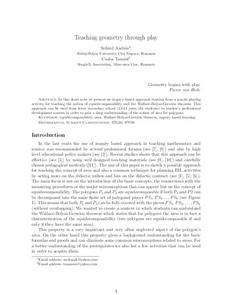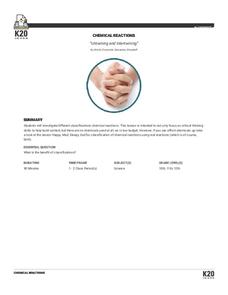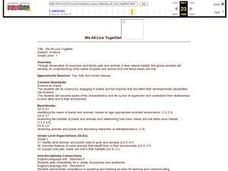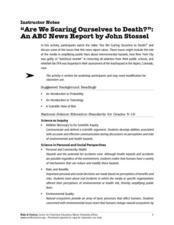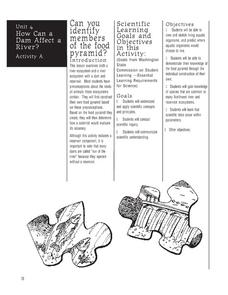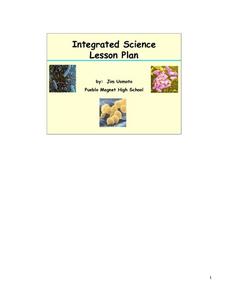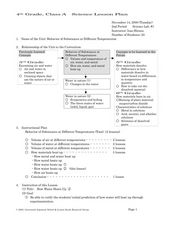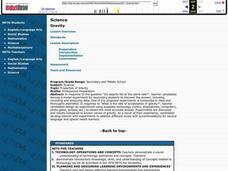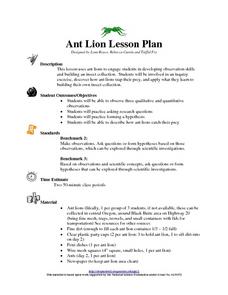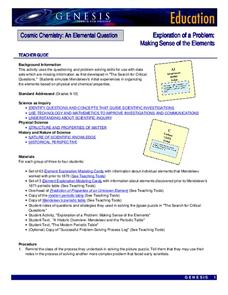Curated OER
Science- Unit on Matter- Solids
Second graders identify and describe properties of matter.
They identify three forms of matter- solids, liquids, and gases with 100% accuracy. The student describes the properties of solid objects.
Curated OER
Science: Floating and Sinking Objects
Second graders discuss why some objects float while others sink. They examine various objects and predict whether or not they will sink or float. Students discover the properties needed for objects to float.
Mascil Project
Teaching Geometry Through Play
Puzzle your way through to a new understanding of area. Scholars learn about the area of polygons through equidecomposability, the idea that polygons that can be decomposed into the same set of pieces have the same area. By using...
K20 LEARN
Untwining And Intertwining: Chemical Reactions
What happened when the chemistry teacher told a bad joke? There was no reaction! A creative take on the traditional reaction types instructional activity invites learners to draw their own conclusions about how compounds and elements...
Curated OER
We All Live Together
First graders examine the lifestyle of classroom and family pets in their natural habitat. They determine the needs of plants and animals, and how those needs are met. They listen to read alouds, sing songs, and draw using computer based...
Tracy Pendry
Cardiovascular/Circulatory System
Explore the circulatory system with a cardiovascular pump activity that promotes discovery and discussion as class members create a functioning model of the heart. Continue the learning process through a web quest showcasing the body's...
Curated OER
Investigate Pine Creek!
Students are invited to become detectives in this Web-Integrated Science Environment (WISE) as they explore a local creek, its environment and ongoing status. Students participate in field trips, acquisition of data through water testing...
Curated OER
Are We Scaring Ourselves to Death?
Interesting! Have your high schoolers watch this 13-minute clip from the documentay, "Are We Scaring Ourselves to Death?" It examines the fear we have as a culture about death and whether or not the media increases those fears. The focus...
Curated OER
Genetically Modified Foods in Perspective
Students research the concept of genetically modified foods. The purpose of the research is to increase science content knowledge and comprehension of the controversy surrounding the subject.
Foundation for Water & Energy Education
How Can a Dam Affect a River? Activity A
Written for Washington state students in life science, this lesson provides an opportunity to examine the residents of local freshwater habitats. You or the class collects a water sample, and learners try to examine what organisms live...
Curated OER
Scientific Method Unit: Bacteria
Young scholars discover how to apply the steps of the inquiry process through the study of bacteria. Working in groups of four, they cooperatively read an article about bacteria and complete a graphic organizer. Group members share with...
Curated OER
The Origin of Life: Alternative Views
Students explore the topics of faith and science as they relate to the origins of life. They consider the major points of Darwin's Theory of Evolution and brainstorm various explanations of how life began. Students investigate different...
Curated OER
How Water Heats Up
Fourth graders conduct experiments heating water. In this inquiry-based early chemistry lesson, 4th graders use the materials given to experiment with the process of heating water. Students draw conclusions based upon their findings...
Curated OER
Termitology
Students engage in an inquiry-based study of the ecology of termites. Through hands-on investigations, they explore the life cycle of termites, the termite's role in the food web, and the unique social structure of termite colonies.
Curated OER
Gravity
Students perform inquiry in response to the question "Do objects fall at the same rate?", teacher candidates discuss a model experiment for secondary students to discover the answer, including recording and analyzing data.
Curated OER
The Greenhouse Effect and Me: How Do We Affect Each Other?
Ninth graders create a model of greenhouse effect in the lab. In this integrated science lesson, 9th graders investigate the different variables affecting this condition. They research about global warming and prepare a PowerPoint...
Curated OER
Striking It Rich!
Fifth graders explore the California Gold Rush. They explore the lure of gold and the Wild West, how pioneers traveled to the West, and the hardships and people they encountered along the way. Activities be authentic, hands-on, and...
Curated OER
The Big "Why"
Students examine the Q.& A. article found each week in the Science Times, focusing on how the answers present scientific data in a clear and logical manner. They write their own questions and answer other classmates' questions in the...
Curated OER
Lesson 12: Ho'olaulima: Let's Make a Hawaiian Garden
Second graders grow a classroom garden that acts as a living laboratory for cross-curricular activities. In this classroom garden lesson, 2nd graders follow directions to build and plant a garden that is used to teach math, science, and...
Curated OER
Introduction to the Scientific Method
Learners participate in an experiment and learn to record it using the scientific method. In this biodegradable plastics lesson, students follow the scientific method to complete an inquiry. Learners complete an experiment with a fish...
Curated OER
Ant Lion Lesson Plan
Students observe three qualitative and quantitative observations. The students further practice the follwoing: asking research questions,forming a hypothesis, and describe how ant lions catch their prey. Students also form hypotheses...
Curated OER
Using Microscopes
Students do an experiment using a microscope. In this lesson, about cells, students examine different slides using a microscope. Students look at an onion skin, cheek cells, and potato cells. In each of these, students find cell walls,...
NASA
Exploration of a Problem: Making Sense of the Elements
When given too much data to simply memorize, it helps to sort it into manageable groups. The second lesson in the six-part series of Cosmic Chemistry challenges groups of pupils to take a large amount of data and figure out how to best...
Texas Center for Learning Disabilities
Second-Grade Comprehension-Based Intervention
Help your youngsters find meaning in the text they read with this series of five intervention lessons. Offering explicit, step-by-step instructions for walking children through shared readings of leveled books, these...




